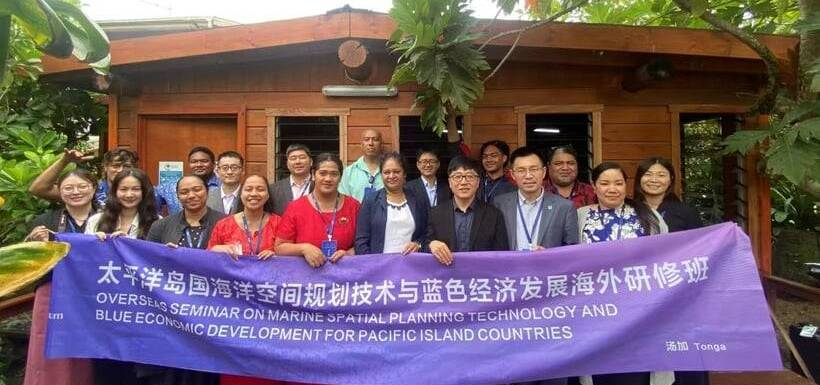News
On June 3, 2021, the council meeting of the Marine Spatial Planning Academy of China Oceanic Development Foundation (the Academy) was held in Hangzhou, with about 40 members of the Academy Affairs Committee, liaison officers of member units and part of the staff of the Secretariat of the Academy attending the meeting. The meeting was presided over by Pan Xinchun, Deputy President and Secretary-General of the Foundation and president of the Academy. Representatives from 13 member units and the Secretariat of the Academy reported the progress of the Maritime Silk Road Project of "promoting marine spatial planning and contributing to blue economy development" (the "Maritime Silk Road Project") and the work of the Secretariat respectively.
 The picture is the site of the Academy council meeting
The picture is the site of the Academy council meeting
Pan Xinchun fully affirmed the work undertaken by the member units in the Maritime Silk Road Project and the work of the Secretariat of the Academy. He expressed his gratitude to the Second Institute of Oceanography of the Ministry of Natural Resources for co-organizing this meeting and providing excellent services and put forward clear requirements for the continuation of a well-done job of the Maritime Silk Road Project and the Secretariat. Pan pointed out that the Maritime Silk Road Project was set up according to the Vision and Actions on Jointly Building Silk Road Economic Belt and 21st-Century Maritime Silk Road, the Vision for Maritime Cooperation Under the Belt and Road Initiative and the conceptual framework of building a blue partnership; it is an important content of the building and construction of a blue partnership in the Belt and Road Initiative, including marine governance, spatial planning, marine economy, marine protection, marine science and technology, marine culture and personnel training, etc. The establishment of the Maritime Silk Road Project has been well received by countries along the Maritime Silk Road and small island states. So far, the Foundation has signed cooperation agreements or memorandums of understanding with relevant departments of 18 countries including Thailand, Madagascar, Panama, Papua New Guinea, Mozambique, Seychelles, Indonesia, Pakistan, Bangladesh, Cambodia, Antigua and Barbuda, Malaysia, Mauritius, Fiji, East Timor, Guyana, Sri Lanka, Costa Rica and an international organization (Pacific Islands Development Forum). The Foundation entrusts the member units of the Marine Spatial Planning Academy to undertake the Maritime Silk Road Project and puts forward requirements to strengthen the economic and social development docking with the project cooperative countries (the "cooperative countries"), to promote practical cooperation in various fields, and to achieve mutual benefits and win-win results for the benefits of the people of countries along the Maritime Silk Road and small island states, taking marine resources and space as carriers, marine spatial planning as the starting point, and marine economy, marine governance, marine protection, marine science and technology, and humanities exchanges and cooperation as the mainline.
Pan said that with more than two years of implementation, the Maritime Silk Road Project achieved phased results as planned. First, a cooperation mechanism has been established with relevant government departments and scientific research institutions in the cooperative countries, and relevant personnel have been trained to enable them to understand the contents of the Maritime Silk Road project and the path of work; Second, relevant data have been collected and survey of relevant sea areas and maritime investigation have been carried out, as well as the comparative advantage analysis and special studies on marine resources development, marine environmental protection and marine industry layout; Third, the Project convenes relevant enterprises in China interested in investing and developing abroad for a discussion and exchange and introduces the resources, location, policies and labor advantages of the cooperative countries to provide services for enterprises to "go global"; Fourth, the Project has cooperated with cooperative countries in marine survey, marine monitoring, marine protection and marine disaster reduction, etc.
Pan stressed that the professional and technical teams of the member units of the Academy should arrange their work by the implementation plan of the Maritime Silk Road Project, concentrate and make full efforts in the following seven aspects: First, make efforts in the innovation of the cooperation mechanism. To establish high-level cooperation, coordination and consultation mechanism composed of leaders from the Foundation, member units of the Academy, relevant government departments of cooperative countries, and embassies of the two countries; To establish a data collection and work coordination mechanism and a daily work liaison mechanism composed of member units of the Academy and relevant government departments and scientific research institutions of cooperative countries; And member units of the Academy should establish professional and technical teams for the Maritime Silk Road Project. Second, make efforts in personnel training and communication. To organize the training of the backbone in relevant government departments, scientific research institutions, social organizations, etc. of the cooperative countries, with new methods, technologies and forms of training courses, enabling them to learn about the construction of the Belt and Road Initiative, the establishment of a blue partnership and the content of Maritime Silk Road Project in all respects, as well as Chinese culture, Chinese achievements and China's ocean governance program; To recruit students from cooperative countries to study in China in a planned and targeted manner, training them into masters, doctors and other professional talents and friendly messengers of Sino-foreign cooperation; To organize more international exchanges to publicize and display the achievements of the Maritime Silk Road Project. Third, make efforts in the preparation of marine spatial planning. To carry out marine industry layout, coastal town development and marine ecological protection in the offshore and inshore areas of the cooperative countries through the preparation of marine spatial planning, and make the cooperative countries effectively connect with China's dual circulation and large market, enabling them to catch up with the "development express" of China and promote the rapid and green development of their economic society; To promote the construction of marine governance system and the improvement of marine governance capacity of cooperative countries through the preparation of marine spatial planning. Fourth, make efforts to help Chinese enterprises "go global". Chinese enterprises are the main force in the construction of the Belt and Road Initiative. To inform the enterprises interested in investing in the industry abroad of the advantages of the cooperative countries timely (including resources, location, labor, policies, etc.) and invite enterprises to participate in the preparation of marine spatial planning and the layout of marine industries; To organize investment promotion activities of cooperative countries frequently and organize relevant Chinese enterprises to visit cooperative countries to understand the investment environment; To provide good services for Chinese enterprises that are willing to invest or are investing or have invested in cooperative countries. Fifth, make efforts in ocean governance and scientific and technological cooperation. To actively cooperate with cooperative countries on marine governance, including the construction of marine management systems, marine monitoring and observation outlets, marine information networks, and marine management capabilities; To actively carry out marine scientific and technological cooperation, which can cover cooperative research on marine ecosystem and biodiversity (such as mangroves, seagrass beds, coral reefs, typical wetlands, etc.), marine protection (such as environmental pollution, marine garbage, seawater acidification, algal bloom monitoring, pollution emergency response, etc.), climate change (such as marine disasters, sea-level rise, coastal erosion, ecological degradation, marine carbon sinks, etc.), ocean observation and monitoring, and marine integrated survey, etc. Sixth, make efforts in the organization, classification and archive of data. The marine data collected from the cooperative countries for the planning is very precious, which can be used for the study of global marine science, ocean observation, marine environment change, sea-level change, etc. Under the requirements of marine survey data management in China, the member units of the Academy should carefully organize, classify, archive, and store them in special cabinets without losing them. Seventh, make efforts to publicize the Maritime Silk Road Project. The Maritime Silk Road Project is a large-scale ocean project set up and implemented by the Foundation to implement the Belt and Road Initiative and build a blue partnership in special, which is also an important content of the Initiative and the partnership. The Foundation has cooperated with 18 countries and one international organization (Pacific Islands Development Forum) to implement the Maritime Silk Road Project in 50 countries within 5 years. The Maritime Silk Road Project is an aid project to promote the economic and social development of countries along the Maritime Silk Road and small island states, which should be vigorously publicized in various forms in the countries alongside the Belt and Road and the international community to tell the maritime story of China.
Finally, Pan Xinchun proposed that all member units should implement the Maritime Silk Road project in the spirit of no time to lose and seizing every minute, devoting to the construction of the Belt and Road Initiative and the blue partnership and presenting a gift for the centenary of the Communist Party of China!
At the meeting, Chen Wujun, Executive Deputy President of the Academy and Party Secretary of the National Ocean Technology Center, Xiang Youquan, Deputy President of the Academy and deputy secretary-general of the Foundation, and Peng Wei, Deputy President of the Academy and deputy director of the National Ocean Technology Center, made statements on doing a good job in the Secretariat and providing services to the member units of of the Academy.

- Marine Spatial Planning Study Tour 2023 Officially Launched
- President Lv Bin Met with Her Royal Highness of Tonga Pilolevu Tuita in Beijing and Signed a Memorandum of Understanding on Cooperation
- Dialogue eyes key role of youth in RCEP region's growth
- Pan Xinchun Attends the 2022 China Ocean Action Roundtable and Introduces Ten Major Actions



 Home
Home  About Us
About Us  Our Programs
Our Programs  Cooperative Partner
Cooperative Partner